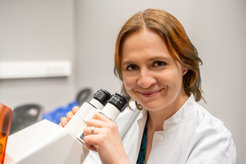Kalina Swist-Rosowska
We want to study what other people discard in their data
In this interview with Kalina Swist-Rosowska, you can explore the mysteries of heterochromatin with a scientist whose childhood curiosity drove her towards a career in science. Learn more about the exhilarating highs of discovery in the lab and the balancing act of raising children while pursuing a Ph.D. and Postdoc.

Tell us a bit about you and your work.
I am working in the Epigenetics department of Thomas Jenuwein, and the lab is working on the establishment of mouse constitutive heterochromatin. Heterochromatin is this part of the cell nucleus, of the genome, which is not so much expressed, not accessible, and rather condensed. So, I think the most interesting part is that we tend to think about heterochromatin as something which is closed and which cells keep closed for an unknown reason, but we sort of treat it like this black side of the moon. Quite often when people do experiments and they are sequencing the whole genome for some studies, they actually discard whatever is repetitive, difficult to sequence or difficult to access. And our lab actually wants to study what other people discard. I think that the most interesting thing is the fact that such closed and repressed DNA is actually expressed and it gives rise to RNA. And then the question is what would be the function of this RNA because they exist in cells with some abundance. So far it's not known.
What motivated you to become a scientist and where there challenges?
So, it might sound funny but I actually knew from my early childhood that I wanted to be a scientist. I think it came from the time that I was always very curious about how things work and this curiosity was encouraged by my parents. And I must say that I also have a lot of teachers in the family so, education was always around and I was very curious about things and I wanted to explore it. And for me, quite quickly, it was obvious that this would be an interesting job for me.
Based on my experience you don't have to be an expert in a field to start studying the field. Studying can make you an expert, but it's okay to not know everything. But if you are interested in something, you should go for it.
When you think about your everyday life in the lab when you work what is the part you live most?
Working as a scientist it's I would say probably 60 or 70 percent of what we do is trying things which fail. Sometimes it's even more. But then, there is this moment when it works and where finally the data are answering what I wanted to answer. And in this particular moment, when I realize it, I'm probably the only person in the world who knows this answer or who's actually seeing it or who's showing it for the first time. This is an amazing feeling. And I don't think there is any other job, at least for me, which could give you this feeling. And this is also what I think when I come to work every day, I never have two identical days. You just cannot be bored there is always something happening and there are so many things to discover. Actually, the list of things to discover never ends. So, I think this is what's driving me.
You raised two kids during your Ph.D. and Postdoc. How did you manage this?

The first thing is, my husband is just as involved as I am and he is very supportive for my career. My boss is super family supportive and I also must say I'm really good at time management. I now learn this thing that when I'm at work, I'm 100% at work. When I'm at home, I'm 100% at home. I think there is external pressure and specially more pressure on females. That's at least my experience if something happens to your child, by default they are usually calling mom, not father. I remember the situation that actually I had to pick up a child from kindergarten, but my experiment was not finished. Meanwhile, my husband was at work and he was coming home only at night. In the night, we went back to the institute together so that I could finish my experiment. I have to take my child and my husband because I was still breastfeeding during this time. Of course, we're not doing it every day. Probably most families don't do this. But in our case, everyone was happy: the child is not hungry, we made it work and my experiment also worked. So it was sort of worth it.
What advice would you give to your younger self at the beginning of a career in science?
Don't always try to finish everything and finish everything perfect to the highest standard, because it's not possible. You have to choose what's the most important and do this as well as you can. Not everything can be equally important. You don't have to fulfill everything to 100% to be still very good in what you're doing. In addition, I would suggest myself to be less judgmental about myself and nicer to myself. (Laughter)









